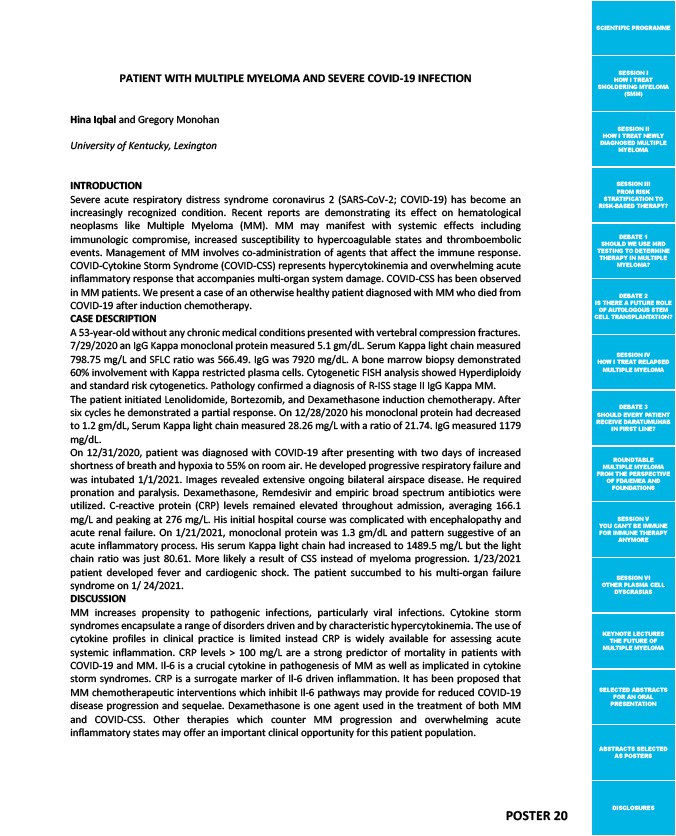
SCIENTIFIC PROGRAMME
SESSION I
HOW I TREAT
SMOLDERING MYELOMA
(SMM)
SESSION II
HOW I TREAT NEWLY
DIAGNOSED MULTIPLE
MYELOMA
SESSION III
FROM RISK
STRATIFICATION TO
RISK-BASED THERAPY?
DEBATE 1
SHOULD WE USE MRD
TESTING TO DETERMINE
THERAPY IN MULTIPLE
MYELOMA?
DEBATE 2
IS THERE A FUTURE ROLE
OF AUTOLOGOUS STEM
CELL TRANSPLANTATION?
SESSION IV
HOW I TREAT RELAPSED
MULTIPLE MYELOMA
DEBATE 3
SHOULD EVERY PATIENT
RECEIVE DARATUMUMAB
IN FIRST LINE?
ROUNDTABLE
MULTIPLE MYELOMA
FROM THE PERSPECTIVE
OF FDA/EMEA AND
FOUNDATIONS
SESSION V
YOU CAN’T BE IMMUNE
FOR IMMUNE THERAPY
ANYMORE
SESSION VI
OTHER PLASMA CELL
DYSCRASIAS
KEYNOTE LECTURES
THE FUTURE OF
MULTIPLE MYELOMA
SELECTED ABSTRACTS
FOR AN ORAL
PRESENTATION
ABSTRACTS SELECTED
AS POSTERS
DISCLOSURES POSTER 20
PATIENT WITH MULTIPLE MYELOMA AND SEVERE COVID-19 INFECTION
Hina Iqbal and Gregory Monohan
University of Kentucky, Lexington
INTRODUCTION
Severe acute respiratory distress syndrome coronavirus 2 (SARS-CoV-2; COVID-19) has become an
increasingly recognized condition. Recent reports are demonstrating its effect on hematological
neoplasms like Multiple Myeloma (MM). MM may manifest with systemic effects including
immunologic compromise, increased susceptibility to hypercoagulable states and thromboembolic
events. Management of MM involves co-administration of agents that affect the immune response.
COVID-Cytokine Storm Syndrome (COVID-CSS) represents hypercytokinemia and overwhelming acute
inflammatory response that accompanies multi-organ system damage. COVID-CSS has been observed
in MM patients. We present a case of an otherwise healthy patient diagnosed with MM who died from
COVID-19 after induction chemotherapy.
CASE DESCRIPTION
A 53-year-old without any chronic medical conditions presented with vertebral compression fractures.
7/29/2020 an IgG Kappa monoclonal protein measured 5.1 gm/dL. Serum Kappa light chain measured
798.75 mg/L and SFLC ratio was 566.49. IgG was 7920 mg/dL. A bone marrow biopsy demonstrated
60% involvement with Kappa restricted plasma cells. Cytogenetic FISH analysis showed Hyperdiploidy
and standard risk cytogenetics. Pathology confirmed a diagnosis of R-ISS stage II IgG Kappa MM.
The patient initiated Lenolidomide, Bortezomib, and Dexamethasone induction chemotherapy. After
six cycles he demonstrated a partial response. On 12/28/2020 his monoclonal protein had decreased
to 1.2 gm/dL, Serum Kappa light chain measured 28.26 mg/L with a ratio of 21.74. IgG measured 1179
mg/dL.
On 12/31/2020, patient was diagnosed with COVID-19 after presenting with two days of increased
shortness of breath and hypoxia to 55% on room air. He developed progressive respiratory failure and
was intubated 1/1/2021. Images revealed extensive ongoing bilateral airspace disease. He required
pronation and paralysis. Dexamethasone, Remdesivir and empiric broad spectrum antibiotics were
utilized. C-reactive protein (CRP) levels remained elevated throughout admission, averaging 166.1
mg/L and peaking at 276 mg/L. His initial hospital course was complicated with encephalopathy and
acute renal failure. On 1/21/2021, monoclonal protein was 1.3 gm/dL and pattern suggestive of an
acute inflammatory process. His serum Kappa light chain had increased to 1489.5 mg/L but the light
chain ratio was just 80.61. More likely a result of CSS instead of myeloma progression. 1/23/2021
patient developed fever and cardiogenic shock. The patient succumbed to his multi-organ failure
syndrome on 1/ 24/2021.
DISCUSSION
MM increases propensity to pathogenic infections, particularly viral infections. Cytokine storm
syndromes encapsulate a range of disorders driven and by characteristic hypercytokinemia. The use of
cytokine profiles in clinical practice is limited instead CRP is widely available for assessing acute
systemic inflammation. CRP levels > 100 mg/L are a strong predictor of mortality in patients with
COVID-19 and MM. Il-6 is a crucial cytokine in pathogenesis of MM as well as implicated in cytokine
storm syndromes. CRP is a surrogate marker of Il-6 driven inflammation. It has been proposed that
MM chemotherapeutic interventions which inhibit Il-6 pathways may provide for reduced COVID-19
disease progression and sequelae. Dexamethasone is one agent used in the treatment of both MM
and COVID-CSS. Other therapies which counter MM progression and overwhelming acute
inflammatory states may offer an important clinical opportunity for this patient population.